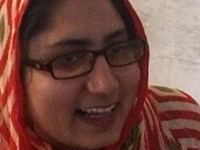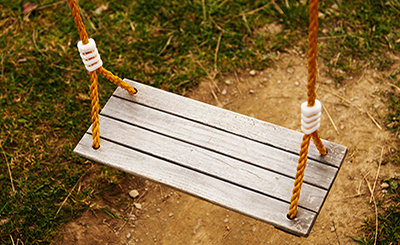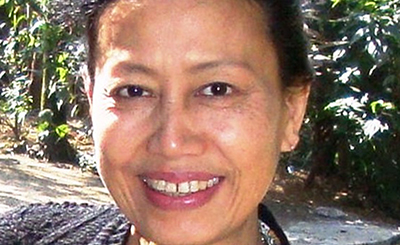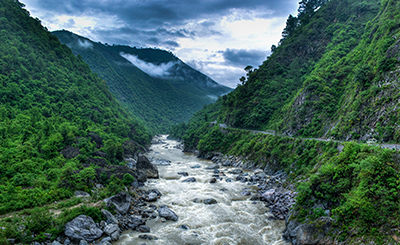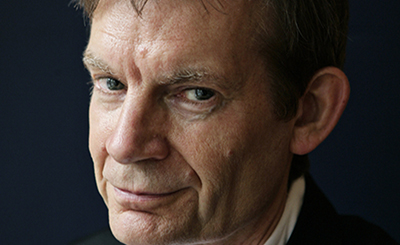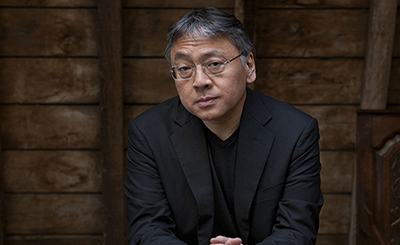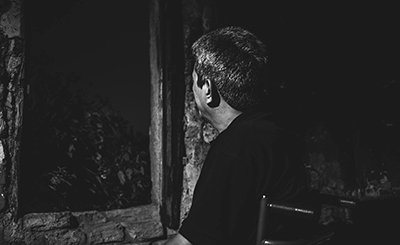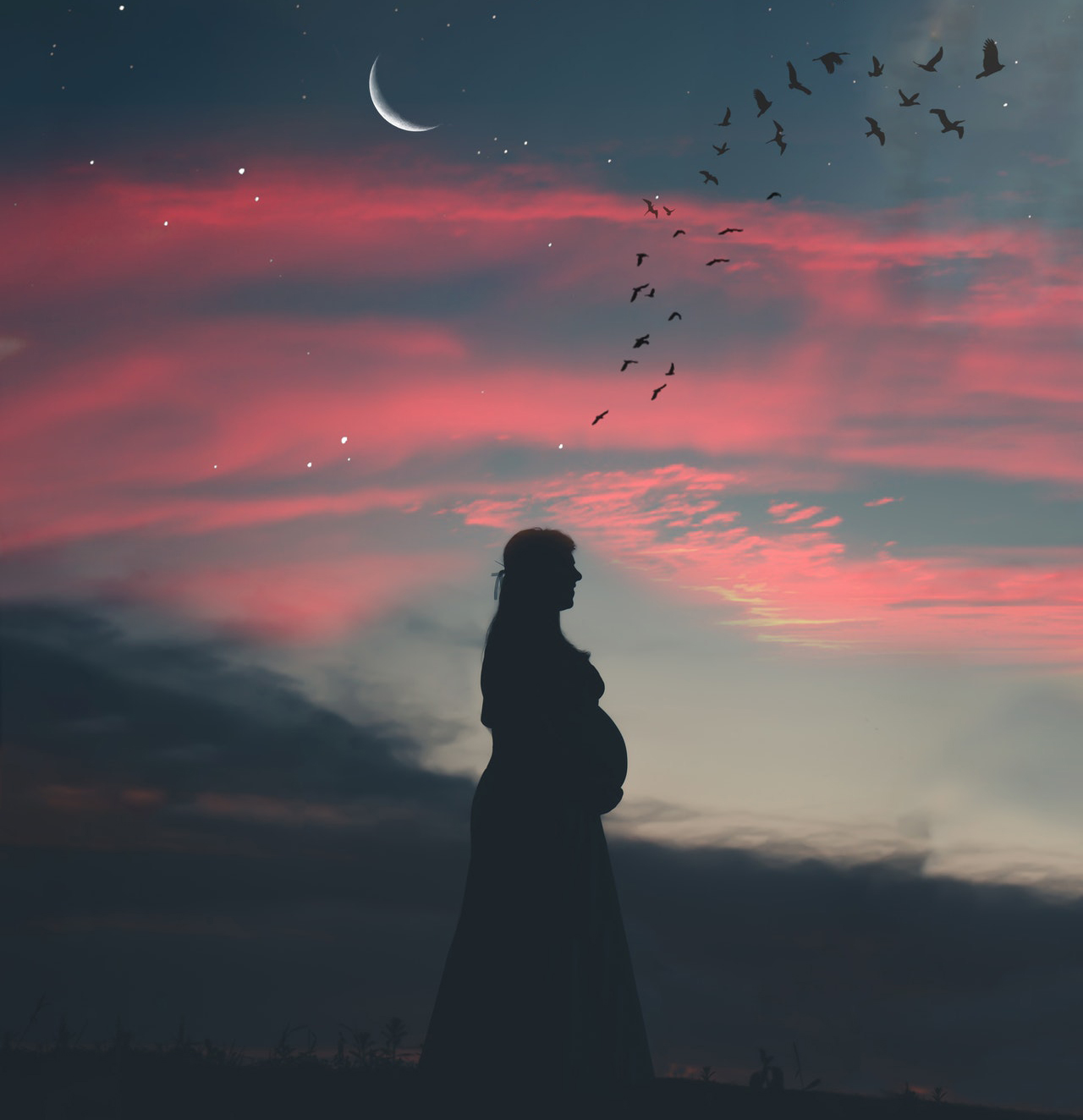
Kulsoom looked up as the old woman came out of the inner rooms. She was ready to go out.
‘Did anyone call a tonga for me?’ she asked. Her voice was rasp. And she was bent low with old age and had a wooden stick in her hand.
‘Yes. I did,’ Kulsoom said in her slow caressing voice. She was rolling breads and baking them on the clay hearth. She was a young woman, but there were old lines around her mouth.
She followed the old woman with her eyes. The old woman shuffled to the door. She had a small jute bag under her arm. On the doorsteps she halted, remembering something.
‘Bahu, I would not be coming back till tomorrow,’ she said to the woman on the hearth as she adjusted the mantle around herself.
‘It is all right, mother.’ The young woman said quietly. She took a lump of dough from the dough plate and rolled it in her hands. As she rolled, the lump in between her hands, the bangles on her wrists started clinking.
The old woman had gone out and was now talking to the horse cart driver outside, settling fare. Kulsoom heard her haggling and a smile crossed over her dark face. At last, they will all be gone out. For the whole day. A deep sigh escaped her. An urgency had come over her dough-rolling hands.
The old woman was going out to visit her sister in the next village. Early in the day, Kulsoom’s husband had also gone out to the farm for the day. Someone was coming to see his newly hatched chickens from the nearby town.
The fire in the hearth was crackling. The coals were red hot. Kulsoom baked breads over them. And as she shifted the breads around with the iron tongs, her red and green glass bangles rang out again. Her dark brows were wrinkled in a frown and there was an air of suppressed excitement about her movements. Her gold nosepin sparkled as the fire from the hearth reflected on it. Somehow, she looked very old and mysterious, sitting there beside the hearth, and baking breads. The hearth was kept in an alcove near the verandah. She looked out into the courtyard where today two roses had blossomed. This is a sign, she thought. In a corner of the courtyard, she kept a garden patch where she had planted various herbs, shrubs and climbers. All was in a tangle. It needs a lot of pruning and weeding, thought Kulsoom, slothfully. She did not really care for the whole garden patch. She was specially fond of roses. Red roses. She tended her roses like children, she having none.
There was so much she had to attend to; sweeping, cleaning, washing, giving fodder to the cattle; that she was left with no time to attend to her plants. She went on rolling her breads, a quiet absorption in her bearing. Her hand reached out for dough on the empty dough plate. She was surprised that all the breads had been made so quickly.
She came out into the courtyard and stood looking around, something weighing on her mind. She was tall and dark and thin. Her face was oval-shaped, with sharp little nose, and coal black eyes that looked at everything with sharp, suspicious glance. Her thin lips were pursed in a decisive manner.
Then a deep sigh escaped her as though something was resolved in her mind. And hurriedly she went towards the door that opened out into the enclosure where the cattle were waiting patiently for fodder. She became fast and urgent and mechanical as she worked in the barn. Usually, it would take one hour of her time to get the work finished but today it barely took half an hour.
Back in the main house, she did things hurriedly. Then she sat down before the tap in the courtyard to wash herself. As she scrubbed her hands and feet, she was thinking. It somehow feels very queer. But what can I do ? I am so desperate, and no one does really care.
The silver trinkets around her feet glittered in the sunlight. Her red and green glass bangles also caught the sun rays and flashed. And something, like sharp dots of light, flashed in her eyes.
She did not sweep the floor, or clean the dishes. All the work would have to wait. She was to hurry in getting there. The day had begun to ripen up, when putting on a veil over her head, she walked to the door. But then she halted, her glance having been caught by the red, red roses. Coming back, she stood looking at them. The sun had come overhead in the sky and making the shy petals of the roses to open up. They were crimson red, and very velvety to the touch. She touched one and something wet touched her womb.
She hesitated a moment, then went to the door very hurriedly. She had put on burqa and a veil. Stepping outside, she walked with purposeful strides on the path that would lead her outside the village.
The wintry sun was becoming hot, and a mild breeze had sprung up, and the rustling green leaves seemed bright on the trees. There were few men around as everyone would have gone out to work. Women were out on their outer courtyard but they were busy making cow dung into mud cake and did not notice her. Children were playing in the streets. They were half-clothed, healthy and lively, running and shouting loudly. Looking at them, something tugged at Kulsoom’s heart.
The road was broken, and ruts were visible everywhere. She had to zigzag around and walk slowly and carefully. She had left behind houses — straw-thatched huts, houses made with clay mixed in cow dung, brick houses — and now came out onto the open road. On either side, the sugarcanes fields stretched to the horizon. This was the harvest time. Men were out in the fields and on the road. A peasant drove his cart in the middle of the road. Kulsoom stepped aside to let the cart pass. She had drawn the veil tightly over her face, so as not to get recognised by anyone.
By the roadside, Eucalypts and Poplars stood trembling in the air. She walked with light, springy steps and came upon the wooden bridge that spanned over the canal. The canal was thin and fast, and came out pouring from the far north. It diverged from the Ganga. Kulsoom went to the railing at the right side of the bridge and looked down on the canal. The water was gushing and flowing. The sun reflected on it, brightening the water.
As far she could see there was the canal, gushing towards her. Trees on the banks were reflected in it. A kingfisher dived down from the branch of a tree in a fast swooping motion; a flash of blue. Against the royal blue of sky the kingfisher’s blue seemed dark indigo. Suddenly, a very old feeling welled up in her ancient, primitive heart. She felt very small in front of the vastness of the sky overhead, the bright golden sun, the flowing canal beneath, the green of trees and the ripeness of stretching fields. A deep shame washed over her, and a strange hesitation made her pause. The smallness within her shrank away and hid itself.
A dove cooed somewhere in the denseness of trees, startling her. She could see a bunch of canvas tents erected over bamboo poles on the opposite bank of the canal. They belonged to the tribal people passing through here. They had come from the far north, from somewhere on the Ganga ghats. They were khanabdosh, primitive and wild. They lived in a perpetual state of moving. They had been camping here for some fifteen days and went out during the day to sell the various herbs they had gathered from the deep north Indian forests.
They were generally called snake charmers because they petted snakes and performed on public places for flour, rice and money. Their womenfolk went into the nearby villages to the houses to do acupuncture to women and sell herbs, liquids and homemade powders that, so they professed, could cure every illness, real or imaginable. Their children also earned their livelihood by performing dance and singing old raw songs on village squares. The native touch in their speech and the open different way of their life made them look fascinating to people. They held an alluring charm for the peasants who had always had to stay at the same place.
Kulsoom started again to walk towards them. This is rather late. They all would have gone out into the village. She hoped against herself. But the smallness had returned.
She arrived on the clearing by the roadside where the snake-charmers were camping.
Women were out on the canal banks, washing clothes, beating on them with wooden sticks. Men were scarcely visible,the majority of them having gone out into the nearby villages. Young girls were working; cleaning pots and pans, tending to their small brothers and sisters, making pitaris for snakes. Small children were playing with snakes, feeding them, twisting them around their half-naked bodies.
Ash heaps were scattered throughout where the snake charmers would have made fire for cooking their food a short while ago. Babies were laid in swings made of cloths tied to bamboo poles on either side.
She approached slowly and stealthily, turning her head left and right to see if anyone was observing. They became aware of her as soon as she entered the clearing, pointing to each other and whispering. Women’s hands stopped beating on clothes. They whispered in unison, ‘Musalmani.’
‘Where is Naga Baba?’ she asked a dark young girl attired in a long kimono, her hair kneaded into many braids. The girl looked at her with big black eyes, trying to understand.
‘Naga Baba?’ there was a sharp note in her voice. She tried to peep through the veil. Children drew near them in fascination. Women were staring at her with open curiosity.
‘She wants to know where Naga Baba is,’ the girl delivered the information to everyone around in her husky voice, as though asking them to tell the visitor about Naga Baba.
‘He went out at the daybreak,’ said a tall young woman. Kulsoom looked at her. She was kohl-eyed and her breasts were pushed out in a tight fitting bodice. Her belly was exposed and a little swollen. Kulsoom stared through the veil at her belly. The woman sensed her looking and the realisation came to her. With a defiant and arrogant movement she tried to cover her pride with the pallu of her saree. Something gnawed at Kulsoom’s heart terribly at the moment.
‘He came back. I saw him entering his tent a short while ago’, a small naked child said, twisting a small yellow snake around her neck.
‘Which tent?’ she asked in a choked voice. The hurt was fresh in her but she felt helpless to repay it. They pointed to a tent on far left side. Kulsoom was not followed to the tent, and it surprised her. The tent was made just like others, with canvas stretched over bamboo poles. But it had its privacy, a curtain had been put on its mouth, and this was more than other tents could boast of. Kulsoom stood hesitating before it. Through large chunks in the curtain smoke came out curling from the inside. He has lighted a fire.
‘Naga Baba’ she said slowly and distinctly but there was no response from within. She caught one side of the curtain and shook gently. Someone coughed inside. She called out loudly. ‘Naga Baba.’
‘Come in’ the voice was barely audible. Drawing the curtain aside, she slipped inside. She could hear children giggling behind her. Naga Baba, clad only in his loincloth, was squatting on the earth before a small lighted fire.
The fire was lighted before a Shiva lingam. A big black serpent was coiling round the lingam.
Naga Baba was worshipping the lingam, the serpent and the fire, with closed eyes. He was also chanting some mantras. An earthen bowl containing milk was kept beside him. He was old, with shoulder-length white hair, but had a muscular body. His face was covered in a dense beard and moustache. Kulsoom felt dread settling in her heart as she saw the pagan worshipping. She wanted to turn and run away, but something held her bound to the earth.
Naga Baba opened his eyes and offered the milk to the black snake. The snake, uncoiling itself, alighted from the top of the Shiva lingam, hissing and opening a very wide mouth. It crawled to the bowl and began lapping up the milk with its long forked tongue, intermittently lifting its hood and hissing.
Naga Baba dropped ghee in the fire to make it sparkle, his lips still mumbling. The flames leaped up to his beard and licked into his eyes. Then he turned his head and looked with grey, fiercely hot glance at Kulsoom.
‘Remove the cloth off your face.’ His voice was surprisingly quiet. Kulsoom hesitated a moment, then reaching up with her left hand she drew the veil aside. She shuddered encountering his dark, penetrating eyes. Kulsoom felt naked in spite of being clothed from head to feet, and his stare was like hot coals on her body.
‘What is it, woman?’ his voice came out thin and persuasive. The old shame washed over her and she flopped on the ground. The sunrays fell on the black canvas of the tent, lightening the insides, and the flames of the fire threw eerie shadows around. Words came stumbling out of her mouth.
‘I am childless,’ she whispered. Raising her eyes to Naga Baba’s, she found him looking at herself with a queer expression on his face. He was waiting for her to speak.
‘It has been fifteen years since our marriage.’ She stopped suddenly, and began scratching the ground with her fingers.
‘And your husband?’
The snake, lifting its hood, hissed. There was almost a human expression on its face. It seemed to be listening attentively to the conversation.
‘He is all right. This is me that something is wrong with.’
Baba dropped more ghee into the fire. The black lingam was polished and bright in the glow of orange colored fire.
“He doesn’t’ really care.’ The old pain wrenched her heart.
‘Lie down on the earth,’ Baba commanded.
A white coldness spread through to the core of Kulsoom. But she obliged by laying herself on the cold earth. Her black eyes flashed in the darkened sunlight.
The earth was cool and rough. Baba drew near her and placed his left hand on her belly. Kulsoom shivered involuntarily. He probed with his fingers, an intense expression on his face. The snake, too, was staring very intensely towards her. The smoke was rising from ghee sprinkled fire. There was a subtle acrid smell in the fire that pervaded Kulsoom’s nostrils.
‘Inhale deeply’ Baba commanded. He had his head cocked to one side, listening to the sounds inside her. An icy coldness spreading to her core, Kulsoom bore the violation of her deep privacy. She could feel her womb resist strongly against the assault.
‘The mouth of your womb is closed, woman.’ Baba whispered, his whisper a dark secret.
‘It is closed to all men.’
‘Will you not have it opened?’ Kulsoom whispered back, all the fear and dread of years echoing in her voice. The snake hissed loudly from the altar. Baba threw an admonitory glance towards it. His fingers strayed everywhere, probing and rubbing. Even though she had on her clothes and burka, his hand felt too intimate and physical. But her womb resisted the touch. It was closed to all men.
The man had begun to chant some mantras, his voice low and monotonous. It had a strange soothing effect on Kulsoom’s nerves. For there had come over her a numbness that made everything seem superficial and meaningless. Through her closed eyes, she peered at the man stooped low over her. He seemed old and dark with flowing white beard, a strange snake smell around him. His cheeks were hollow and thin due to constant blowing on the flute. His rough crooked fingers went deeper in her and the lips moved in mumbling.
Kulsoom inhaled deeply the smoke scented air. The flower of my womb is closed to all men. The heathen bent towards her face and whispered;
‘I can have your womb opened. I know of something that it will respond to and gape its mouth to.’
In the tent something had crept in; a foreboding of something sinister and evil. The pagan’s breathing had become fast and labored and his whisper harsh and husky. He fleetingly touched her left breast.
Heaven won’t ever forgive me this sin. A crooked smile came over Kulsoom’s lips. The man went on chanting his mantras and blowing on her womb.
‘I have just the medicine for you, but you will have to pay for it.’ He said, at last getting up. The man went to a corner of the tent where was laid his cloth-made jhola. Dipping his hand in it, he scoured through for a long time. Kulsoom saw him kneeling on the rough floor, an open excitement about his old movements. That was how she would remember him after the catastrophe.
He extracted a small oblong-shaped wooden box and came with it to her side.
‘Now get up, woman.’
Kulsoom sat up, smoothing her ruffled up clothes. The man opened up the box and took out from it two round little pills. They were coated heavily with dough.
‘Take this medicine.’ He handed her two small ball-like pills and started looking at her with a curious expectancy. With an imperceptible movement, she took off a silver anklet from around her left foot. The old man looked at it, then he snatched it from her hand.
‘Take off the other one too. This is not worth much.’
Kulsoom took off the other one too with resignation and handed it to the snake charmer. She could see the covetous look on the man’s face. He was examining the two silver anklets and she was ogling at the two flour-coated pills. Then he pocketed the two chains and, turning to her, said, ‘Take one pill after three days of purifying yourself, and then go to your husband’s bed.’ He stopped, staring at her.
‘And the other one?’ She was getting fidgety and uneasy before his intense gaze and wanted to escape.
‘Take that afterward.’ He looked at her meaningfully. She stood up. The old snake charmer went towards the altar, dismissing her. The fire had died down, and the smoke was curling in white rings. He threw some frankincense in it and it made the air sweet. The snake had drunk all the milk, and was now curled around the lingam. It turned its head towards her as she drew the curtain aside to step out. Her eyes met the snake’s hooded eyes, and shivering, she stepped out.
Children peered at her, giggling, as she came out. Women, too, turned their heads briefly. She gave them a lingering look, with her sun-struck, blinking eyes and walked out the clearing onto the road. The mustard fields stretching across the horizon, the golden bright sunlight ripening them, the blowing wind making the mustards flowers simmer; it was all so serene and sublime. Something had gone quiet inside Kulsoom, too. She walked with bowed head, impervious to the surroundings. Her veil fluttered in the wind and she tried to keep it down with her hands, the black burka trailing behind. There was no urgency about her. She walked with dull, slow steps.
She heard the muezzin in the village mosque calling for prayer. Her hand went instantly to her throat. Her sheh-rag fluttered like a caged bird. The other hand clutched the two globules. She was counting the days when she would have her curse and five-six days of uncleanness. Three days after the ritual bath and then my womb would be perforated.
There was the dargah of an ancient pir just outside the village. It seemed deserted. Something made her halt at the gate. She wanted to go inside and pray, but a tremor ran through her at the thought and she turned back. She entered the village. Two or three men were walking to the mosque. Otherwise the streets were deserted. With a relieved sigh, she pushed the house door open and went in.
***
The day had dawned like it did every day. But, for Kulsoom, it was very special. As she attended to everything, a nervous twitch began around her mouth. The old woman had gone out into the courtyard to make mud cakes. The day went with a regular rhythm, and she was kept busy with the household chores. And when, in the mid-noon, she was exempted for a while off the urgent and immediate tasks, dragging a cot to the garden corner, she lay down under the bright warming sun. Sunrays penetrated her, and a warm rush fused into her body. The sun seeped into her, mingling with her blood, and travelled to her heart. She felt her body pulsating under the assault of a gentle, yet irresistible sun. But even the sun could not make her womb open up. It was also shut out of the dark cavern of her womanhood.
She had watered the plants and a raw soil-blended odour spilled out of the earth and entered her nostrils. She inhaled it and it flowed to her innermost core, but it was also denied the entrance to her womb. Around her were scattered the different hues of colors: the scarlet roses blowing proudly in the wind, the aureate marigolds standing quietly in a corner, a pocket of the garden was tucked up, filled with verdant coriander leaves. Sky was the colour of kingfisher’s feathers. Eagles flew overhead with easy graceful movements and cast shadows on the earth in their downward flight.
A gust of west wind bearing pollens and seeds blew over her. The fecund winds pass through me and leave me barren. Plants are shedding leaves and again they will come out renewed. A group of pied mynas alighted on the naked, unleavened branches of the mulberry tree, twittering proudly and happily. They were with their young ones. Squirrels were playing with their babies. The cold reserve of her body was melting but the mouth of her womb remained closed. For a long time, she was submerged in thoughts, very peculiar and passionate in nature.
It was early night when her husband came home. He came with springy, uncertain strides, and to Kulsoom, he looked like a cock. He was a medium-sized man, not too fat. She gave him food and water and which he ate and drank noisily. She squatted down before him and observed his slow and sloppy manners. He had a hawk-like expression, and his eyes were sharp pinpoints of light. He seemed to Kulsoom full of obscene growths. How can I ever expect my womb not to resist this man?
The old woman was praying, sitting on divan in the verandah and her spontaneous ejaculations were reaching them. The fire in hearth had died down and a grey smoke was rising out of dead coals. The man was prattling about chickens and cocks.
‘I bought two new cocks today — very good, real one and cheap —fairly robbed the farmer; a fool he was.’
He sniggered in a dirty manner. Kulsoom felt nauseated at the thought of nuzzling with this foul man. The old woman had begun to chant verses from Quran now and they fell like lead on Kulsoom’s ears. Her conscience was twisted around. But her heart was set upon the felony. What is the sin of heart compared to the darkness of womb? She rekindled the fire in hearth. Then, she brought out a clean clay bowl and filled it with coals, next she opened a pouch of fragrant tobacco and, mixing it with embers, she fitted it on the hookah. The man was amazed. Usually, she would not prepare his hookah. Handing out the hookah to him, she whispered, ‘Don’t’ go out tonight. Wait for me.’
She swallowed one pill with water and went to her husband’s bed. She sprinkled scented water over her body and in between her breasts she rubbed musk to disguise the foul sweat-mingled smell. As she put out the candle, she was aware of an acute stirring inside her womb and something slippery touched her there.
***
It was dusk. Sky was a sombre, mild blue, laden with grey, nomadic clouds. Flocks of pigeons flew over against the space. Birds were returning home from the fields. It had been nearly eleven months since Kulsoom had conceived. Still she had not delivered. Everyone had been greatly astounded at her conception. Her husband and mother in-law had thought this no less than a miracle. The old woman had considered it an outright fulfillment of the vows she had been making at the shrines of countless pirs and fakirs for years. News of Kulsoom’s insemination had circulated in the whole village, travelling to other villages as well. She had been declared a barren woman for a long time. Childless women from far and wide came to ask her how she had been cured of barrenness. Kulsoom conveyed to everyone that she had prayed at the dargah of the ancient pir outside the village. In a fortnight, the dargah had become very famous, attracting a throng of women who came to be cured of infertility.
But, now, nearly eleven months had passed since impregnation, and there was still no sign of parturition. The old woman was frightened. She hobbled to and fro, gathering spices that had been laid out to dry in the morning. Today, when she went out to the village square to buy ration, women there had whispered among themselves, pointing at her. She was aware of the strange rumours about Kulsoom that were spreading around. It seemed someone had seen her going towards the snake charmers’ tents when they were camping there last year.
The old woman was scared of Kulsoom, in a way, looking askance at her swelling belly. She felt a strange repulsion whenever Kulsoom happened to be near her, and if by chance her belly brushed by her, she shuddered. She had noticed the change that had come over Kulsoom; a quietness and dullness in her movements. She lounged around the whole day, listless and lethargic. Now she was sprawled out on the string cot, waiting for the village doula that her husband had gone to fetch.
The sunset filled Kulsoom with dread. The darkness was spreading its wings slowly, yet firmly. Trees outside on the horizon, so bright in sunlight, had now assumed a sinister aspect. There was a gravity and somberness in the atmosphere that seeped itself into Kulsoom. She looked around with an empty gaze. The whole garden patch was in a mess, but her roses were in bloom — a daub of scarlet against the melancholic, colourless tangled plants. She could feel the old woman’s animosity as she shuffled around muttering under her breath. She knew she looked very weird, with her slothful air and enlarged belly. Her belly was growing bigger and heavier each day. It was getting harder to drag herself around. I won’t be able to move around in a few days, she thought, dismayed.
She was distracted out of her fetid thoughts to see her husband arrive with the midwife — a middle aged, thin, hawk-faced woman.
‘It has been over ten months and she has not delivered yet, just check her to see what is wrong with her,’ the old woman said.
More from The Byword
Comments
*Comments will be moderated
It’s a God gifted art I like it fiction
Mohd Shehzad
Feb 7, 2024 at 03:06
One could imagine the whole thing happening before one’s eyes. Nice and elaborate !Carry on
Singh Gunjeet
May 21, 2021 at 06:41
One could imagine the whole thing happening before one’s eyes. Nice and elaborate !Carry on
Singh Gunjeet
May 21, 2021 at 06:41
ðŸ‘ðŸ‘ðŸ‘ðŸ‘ðŸ‘ðŸ‘ðŸ‘
M pundir
Nov 27, 2019 at 02:47
A very descriptive piece Sobia. I like that the descriptiveness of the story aids its flow. Kulsoom is so relatable. So believable.Keep writing!
cynthia abdallah
May 20, 2019 at 07:03
A very descriptive piece Sobia. I like that the descriptiveness of the story aids its flow. Kulsoom is so relatable. So believable.Keep writing!
cynthia abdallah
May 20, 2019 at 07:03



